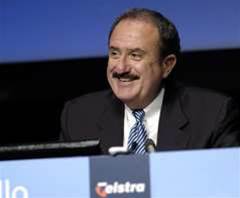The real reason Sol Trujillo is departing for the US come June 30, Budde says in his report, is because the CEO "lost his gamble" with the Government and is now a "liability" in relation to the NBN.

"It would make sense for him to be replaced by a person who could affect a reconciliation with the government," Budde says.
But that reconciliation won't happen, Budde surmises, while ever McGauchie is chairing the company.
"Conflicting messages are now coming from Telstra - on the one hand, olive branches are being held out towards the NBN process, but at the same time McGauchie is unrelenting in his opposition to such an approach. No wonder the share price is slipping further."
Telstra needs to change its position, Budde says, for both the sake of its shareholders and the Government.
"If Telstra maintains its hardline position, the Government might even go so far as to start the process of full structural separation for the incumbent."
Budde says the Government need not be "hoodwinked" into considering Telstra as the only carrier that can build a national network.
"In the end it is just another construction project, "he says.
Telstra still has a window to be involved in the NBN tender, Budde says, in the very least as "a supplier."
"There is certainly room for Telstra to re-engage," he says. "[But] they will need to face the reality that telecoms is a public good and constitutes essential infrastructure for the national economy."
Look to fibre-to-the-home
As for the NBN itself, Budde recommends the Government see Fibre-to-the-node (FttN) only as a stepping stone to a Fibre-to-the-home (FttH) future.
Budde says FttN will only lead to more access disputes as competitors attempt to seek access to the estimated 22,000 street cabinets required to network the nation.
An FttN network would only compete with Telstra's own roll-out of ADSL2+, Budde says, which might well go national before any NBN could be built.
"The industry should immediately move the target to FttH and we should not limit ourselves to the goal set back in 2004 for a very slow FttN network operating at 12Mbps," he says.


_(28).jpg&h=140&w=231&c=1&s=0)
.png&h=140&w=231&c=1&s=0)
_(23).jpg&h=140&w=231&c=1&s=0)






 iTnews Benchmark Awards 2026
iTnews Benchmark Awards 2026
 iTnews Executive Retreat - Security Leaders Edition
iTnews Executive Retreat - Security Leaders Edition
 iTnews Cloud Covered Breakfast Summit
iTnews Cloud Covered Breakfast Summit
 The 2026 iAwards
The 2026 iAwards












_(1).jpg&h=140&w=231&c=1&s=0)



